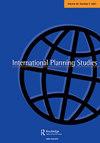Spatial planning in the digital age: the role of emerging technologies in democratising participation in spatial planning in Ghana
IF 1.5
Q4 REGIONAL & URBAN PLANNING
引用次数: 3
Abstract
ABSTRACT Planning practice has evolved from technocratic to participatory approaches. This is driven by the need to ensure that the stakeholders of development programmes are involved in making decisions. However, participatory planning, often excludes interested publics from planning processes, due to several barriers. As such there is a recourse to digital technologies aimed at broadening participation of interested publics in planning processes. This study sought to unpack the reasons why digital technologies are not widely used in spatial planning processes in Ghana, in spite of the availability of, and possibilities for doing so? And what forms of technology can help us deepen public participation in spatial planning in Ghana? The study established that various web and mobile technologies and apps exist to aid participation in planning in Ghana, although such a process must be backed by national efforts to deepen transparency in governance and enhance digital literacy and penetration.数字时代的空间规划:新兴技术在加纳空间规划民主化参与中的作用
规划实践已经从技术官僚的方法演变为参与式的方法。这是由于需要确保发展方案的利益攸关方参与决策。然而,由于存在一些障碍,参与式规划往往将感兴趣的公众排除在规划过程之外。因此,可以求助于旨在扩大感兴趣的公众对规划过程的参与的数字技术。这项研究试图揭示加纳空间规划过程中没有广泛使用数字技术的原因,尽管数字技术的可用性和可能性?什么形式的技术可以帮助我们加深加纳公众对空间规划的参与?该研究表明,加纳存在各种网络和移动技术及应用程序,以帮助参与规划,尽管这一过程必须得到国家努力的支持,以深化治理透明度,提高数字素养和普及率。
本文章由计算机程序翻译,如有差异,请以英文原文为准。
求助全文
约1分钟内获得全文
求助全文
来源期刊

International Planning Studies
REGIONAL & URBAN PLANNING-
CiteScore
4.60
自引率
4.80%
发文量
20
期刊介绍:
Planning, at urban, regional, national and international levels, faces new challenges, notably those related to the growth of globalisation as both an objective socio-economic process and a shift in policy-maker perceptions and modes of analysis. International Planning Studies (IPS) addresses these issues by publishing quality research in a variety of specific fields and from a range of theoretical and normative perspectives, which helps improve understanding of the actual and potential role of planning and planners in this context.
 求助内容:
求助内容: 应助结果提醒方式:
应助结果提醒方式:


